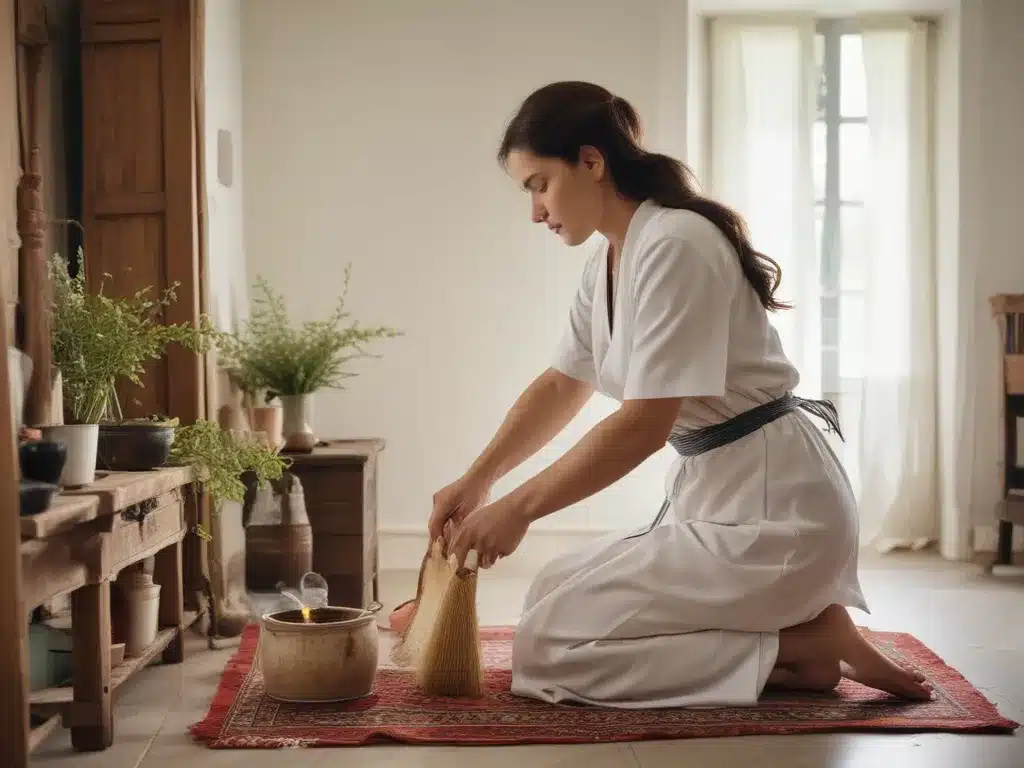Introduction
As a professional cleaning company, we at AdamCleaning.uk understand the importance of maintaining a clean and organized living space. However, beyond the physical aspect of cleanliness, many religious and spiritual traditions recognize the profound significance of purifying one’s home and environment. In this comprehensive article, we delve into the fascinating world of religious cleaning rituals, exploring the diverse practices, symbolism, and spiritual beliefs that underpin these sacred traditions.
Purification Rituals in Hinduism
Hinduism, one of the world’s oldest religions, places great emphasis on purity and cleanliness. The concept of “shuddhi” (purity) permeates numerous aspects of Hindu life, including the home environment.
Ghar Shanti Puja
The Ghar Shanti Puja is a Hindu ritual performed to purify and sanctify a home. It involves invoking divine blessings and seeking protection from negative energies. During this ritual, sacred mantras are chanted, and various religious symbols, such as the swastika and Om, are drawn on the walls and floors using rice flour or turmeric paste.
Cleansing with Sacred Substances
Hindus often use sacred substances like cow dung, cow urine, and holy water from sacred rivers like the Ganges for purification purposes. These substances are believed to have powerful cleansing properties and are used to ritually cleanse homes and surroundings.
Islamic Cleansing Practices
In Islam, cleanliness is not only physical but also spiritual. The concept of “tahara” (purity) is integral to Islamic faith and extends to various aspects of life, including the home environment.
Wudu and Ghusl
Before performing certain religious rituals or entering a mosque, Muslims perform “wudu” (ablution), which involves washing specific parts of the body with water. Additionally, “ghusl” is a full-body purification ritual that involves bathing in a prescribed manner, often after significant life events or before religious festivals.
Purification with Zamzam Water
Many Muslims believe in the purifying and healing properties of Zamzam water, a sacred well located within the Masjid al-Haram mosque in Mecca. This water is often used for cleansing and purification rituals, as well as for drinking and other purposes.
Buddhist Purification Rituals
Buddhism emphasizes the importance of inner peace and harmony, which is reflected in various purification rituals and practices.
Purification with Incense and Chanting
In Buddhist traditions, incense and chanting play a significant role in purifying the environment. The burning of sacred incense, such as sandalwood or nag champa, is believed to cleanse the air and create a conducive atmosphere for meditation and spiritual practices. Additionally, chanting mantras and sutras is believed to purify the mind and surroundings.
The Practice of Mindfulness
Mindfulness, a central tenet of Buddhism, is often considered a form of purification. By cultivating mindfulness and being present in the moment, Buddhists aim to cleanse their minds of negative thoughts and emotions, fostering a sense of inner peace and harmony.
Christian Cleansing Rituals
Christianity has its own rich traditions of purification and cleansing, often rooted in biblical teachings and spiritual symbolism.
Baptism and Blessing of Homes
In Christian traditions, baptism is a sacred ritual that symbolizes purification and the cleansing of sin. Many Christians also practice the blessing of homes, where a priest or minister invokes divine protection and purifies the living space through prayer and the sprinkling of holy water.
The Use of Holy Water and Incense
Holy water and incense are commonly used in Christian rituals and practices. Holy water is believed to have purifying properties and is often used for blessings, baptisms, and other rituals. Incense, particularly frankincense and myrrh, is burned during religious ceremonies to purify the air and create a sacred atmosphere.
Indigenous Purification Rituals
Across various indigenous cultures, purification rituals are deeply rooted in their spiritual beliefs and connection with nature.
Smudging and Sage Burning
In many Native American and indigenous traditions, the practice of smudging involves burning sacred herbs, such as sage, cedar, or sweetgrass, to purify and cleanse individuals, homes, and sacred spaces. The smoke from these plants is believed to carry away negative energies and promote spiritual harmony.
Sweat Lodges and Cleansing Ceremonies
Sweat lodges and cleansing ceremonies are common practices among indigenous communities. These rituals often involve the use of heated stones, steam, and purifying herbs, and are believed to promote physical, emotional, and spiritual purification.
Modern Interpretations and Adaptations
While traditional religious cleaning rituals have been practiced for centuries, many individuals and communities have adapted and incorporated these practices into their modern lives.
Home Blessing and Space Clearing
The concept of home blessings and space clearing has gained popularity in recent years. These practices involve using various techniques, such as burning sage, salt cleansing, or sound healing, to purify and energize living spaces. Many individuals believe that these rituals promote a sense of peace, harmony, and positive energy within the home.
Mindful Cleaning Practices
Inspired by mindfulness and spiritual traditions, some individuals have embraced the notion of mindful cleaning. This approach involves consciously and intentionally cleaning one’s living space, treating the process as a form of meditation and self-reflection. By being present and focused during cleaning activities, individuals aim to cultivate a sense of calm and clarity.
Conclusion
Religious cleaning rituals are deeply rooted in cultural and spiritual traditions, serving as a means to purify not only the physical environment but also the mind, body, and soul. Whether it’s the Ghar Shanti Puja in Hinduism, the use of Zamzam water in Islam, the practice of mindfulness in Buddhism, the blessing of homes in Christianity, or the smudging ceremonies of indigenous cultures, these rituals reflect the profound connection between cleanliness and spiritual well-being.
As we continue to explore and appreciate the diverse religious and cultural practices around the world, it is essential to approach these traditions with respect and an open mind. By understanding and embracing the significance of purification rituals, we can cultivate a deeper appreciation for the profound connections between our physical surroundings and our spiritual selves.
If you’re interested in learning more about professional cleaning services that prioritize respect for religious and cultural practices, we invite you to visit AdamCleaning.uk.







